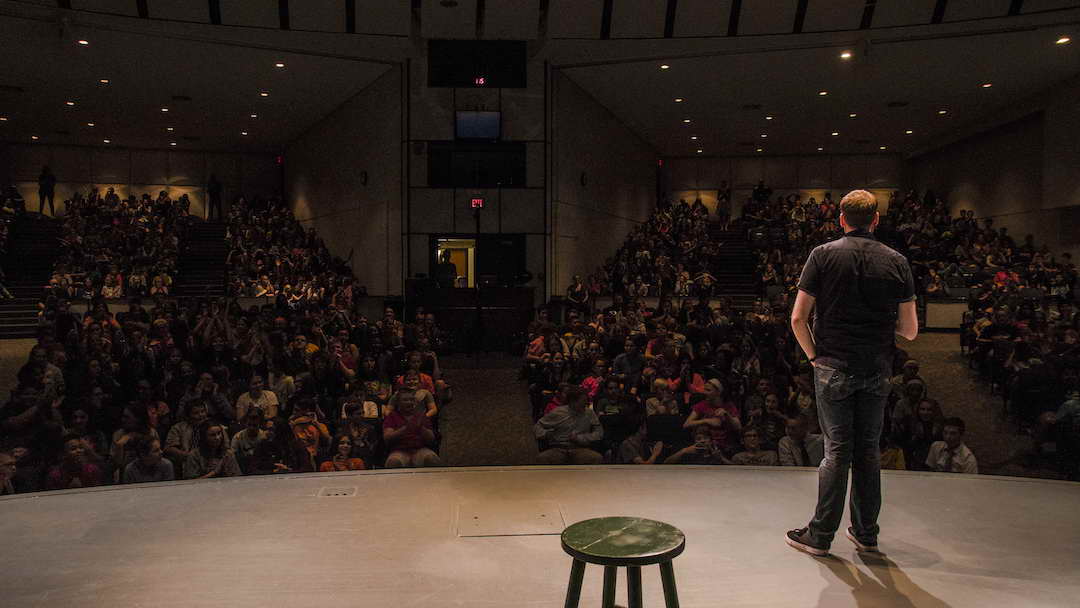The Bully Was a Constant in Life
At 33 years old, Jeff Veley is an internationally awarded and recognized speaker and trainer in the war against bullying. “We’ve been on this 20- plus- year war on bullying,” he states. You look at the origin of the anti-bullying movement, it really started April 20, 1999, when the first shots rang out at Columbine. Since this has happened, of course, there have been a ton of anti-bullying laws. First, it was a lot of advocacy around zero-tolerance policies. [Then] seven years ago, the [U.S.] Department of Education came out and said, ‘Hey Schools, we actually found out that zero-tolerance makes things worse. It raises hostility. It causes kids not to report. Stuff is more likely to go down at the bus stop, not in the classroom. It’s more likely to happen online versus in person. Remove your zero-tolerance policy.’ All these years later, I still find schools with a zero-tolerance policy. Their campus is in chaos and they have no idea why.
Jeff says that “When it came to this issue of bullying, or social aggression, or conflict, we were simply telling kids to “ ignore it, walk away, tell an adult. It’s likely the same advice you learned when you were a kid. The problem is, it doesn’t work. So, since this answer wasn’t good enough, I made it my life’s mission to figure out the best solution to this problem.”
For Jeff, this is a mission born of personal experience. He says, “Growing up, I was the nerdy kid that never seemed to fit in. Freakishly long arms, red hair, nerdy-looking glasses, kind of overweight. I stood out like a sore thumb. I went to schools, primarily, that were very sports-focused. I just was NOT gifted in that area. I was the drummer, the kid always doing magic tricks – just didn’t fit in. There was a lot of getting picked on in school and not knowing how to navigate that.
“I found out at an early age that I have Attention Deficit Disorder, or what they now call Attention Deficit Hyperactivity Disorder, and OCD (or Obsessive-Compulsive Disorder). I like to tell people that I have to do things perfectly, but not for very long. Like many kids who struggle with learning differences, I became a mean kid magnet. That was my school experience.“
Home had its issues as well. Jeff continues, “I had this unique opportunity with my dad, who was very active in entertainment. He was a touring rock guitarist before I was born. I grew up on stage, behind the scenes, falling asleep in recording studios, and on the weekend wanting to hang out with him. What no one knew is that my mom and I had a pretty toxic relationship. There was always this not feeling like I fit in at school, and then not wanting to go home”
These experiences eventually coalesced in his working career. After following in his dad’s entertainment footsteps for a number of years, Jeff says that “All of a sudden, passion for entertainment and other talents combined with my desire to really empower kids that were struggling socially and emotionally. That culminated with me working at a non-profit for six and a half years, running residential treatment programs, community after-school programs, and group homes. I helped establish one of the first group homes in Michigan for community mental health clients aged 6-17. All of the kids I worked with had been abused or neglected. They were dealing with a lot of the things that I had dealt with and, for many kids, a lot more severe. In examining the reasons given by our clients for being on suicide watch, I found that the number one issue was bullying. [There were] more kids wanting to take their life because of that one issue than anything else.”
It’s Not “Bully” Anymore
For over a decade now, Jeff has worked with youth who have experienced abuse or neglect. Jeff says, “Many of the kids I worked with have distrust when it comes to adults and systems. They’ve been victimized and feel powerless. I started to obsess about an empowering solution, so they could solve their own social problems.”
What Jeff eventually came to realize is that zero tolerance and traditional ways of dealing with bullying were not effective. “The problem with the word ‘bullying’ is that educators have bully fatigue. Anytime someone is mean or they stick their tongue out at someone else or roll their eyes, kids think that they are being bullied. Now, someone gets beat up, ‘Ah, I’m being bullied!’ No, that’s assault and battery. Bullying is an imbalance of power, with the intention to cause harm, that’s repeated over time. It’s behavior that could hurt your feelings, It is not behavior that can harm someone’s body or property.
“Every state has developed their own legal definition of bullying. In fact, the word “bullying” now has five different generally accepted definitions. When you say ‘My kid is being bullied,’ the person on the other end of that conversation doesn’t really know what happened. It brings a lot of emotion and a lot of confusion. The parents’ worst fear is suicide, the school’s worst fear is getting sued. The kid’s worst fear is that it’s going to continue and you’re not actually going to help them solve it.
“The word has become an emotional detonator. It’s unhelpful. If the word “bullying” is in the conversation, often logic is not. No matter the behavior, the origin is the same. It all starts as a squabble, rooted in aggression.
By looking at the problem from a different perspective, Jeff realized that if a person could correct the imbalance, the situation should improve. “By definition, bullying is an imbalance of power. Trying to stop or remove power from the aggressor is a futile effort. It must be easier to EMPOWER the target. They are the one who’s crying out for help and will try just about anything to change the situation.
“What I teach is the Peace Sign Approach; it’s incredibly simple and powerful. Think about giving someone the peace sign in the air. You’ve got two fingers up. The whole idea is to help kids resolve conflicts in two simple steps. When someone is trying to hurt your feelings, use these two skills.
“Squabbles are all about power. It’s a game. If you get upset, you lose; they win. That’s their whole goal: to make you upset and have power over you. They are looking for an emotional reaction or outburst. Once you know their strategy, it’s easy to win. You can learn not to let their behavior hurt you, there’s no offense, and therefore no conflict. You don’t have to be the most confident kid. You simply need to appear confident in the moment. To teach this, role play numerous scenarios. The most effective way to prepare a child is to rehearse their response. Words don’t have to hurt you. They only have the power that you give them. We rehearse and we roleplay this to build emotional resilience in step one.
“Step two is ‘Treat your enemy like a friend.’ We take the person that’s being mean and say, ‘Nuh-uh. We know your strategy. You expect me to get upset and treat you like an enemy. Instead, I’m going to stay calm and treat you like a friend.’ They aren’t going to expect that and it’s almost impossible to continue being mean to someone who is nice to you. Essentially, there is this thing that happens inside called a ‘crisis of conscience’ where you start to examine your own behavior, and you’re actually disgusted by how you’re treating someone else. For 98% of the world, this is what occurs in their mind, and they stop the mean behavior. It’s leveraging the Golden Rule, which was invented to deal with enemies, in your favor.
“It’s incredibly simple to learn and to use. The most important part is role-playing it. I’ve never taught a kid effectively by lecturing or having a conversation – only through role-playing, where they practice. The first time [through], I get upset and allow them to feel powerful. It’s fun for them to control me. The second time, I don’t get upset and I treat them like a friend. Instantly they feel powerless. In that moment, they realize that they can retain their power by being calm and kind. There’s no way to overpower me if I refuse to get upset.
“Often when I speak to an audience, one teacher will come up afterward and say, ‘Jeff, I think you helped a lot of kids, but one thing I noticed is that you spoke to everyone in the crowd like they’re a victim. What about the bullies? Why didn’t you address the aggressors in the crowd?’
“Well, there’s an interesting thing. Research shows us that at least 90% of those that try to dominate or are aggressive feel like they’re victims. They self-identify as a victim regardless of whatever aggressive behavior they are doing. I’ve learned that in order to get them on board with my approach and help them examine their behavior, I first have to speak to their pain and their struggle. That’s always step one. I will also remind the teacher that using the word bully guarantees that they’ll have problems solving it. Calling someone a ‘bully’ is name calling (or bullying). If you want to stop bullying, stop using the word. Instead, clearly define what happened and avoid labeling the child.
“The missing piece is that a lot of folks haven’t seen the changes that an empowering approach like this can make. Once they see it, that’s all they want to do. They realize you’re giving the power back to the kid who is getting picked on. No longer do they have to be powerless. They transform from a victim to the hero of their own story. It turns the adults from being the ‘bully police’, which is not a fun role, into a coach and a cheerleader for that kid to help them navigate that situation with more skills than they started with.
Connection and Understanding is Key
His easy, relaxed demeanor in front of an audience belies the fact that public speaking did not come naturally to him. Jeff recalls one memorable day that set him on his current course. He recalls, “I got a position with that [Not for Profit] company, at one point, where they forgot to tell me that I had to speak on behalf of the organization at large events. You’d think this would be an important detail! For me, at that point in life, I was in my early 20s, confident behind a drum set, singing, acting, involved in theater. Give me a deck of cards and I will blow your mind. But just me and my story still felt too vulnerable.
About two weeks before one of these big events they realized that through a breakdown in communication I had no idea I was expected to give a speech. So they come to me and they say, ‘Hey, there’s an auditorium full of students and we forgot to tell you that we need you to give the message’. At this point, I’m locked into the job. So, I have to sit up in front of hundreds of students. It’s not like an audience that’s going to clap you up because you had a funny joke, all these kids were at an alternative school and most were on probation!
“I was terrified. I don’t even remember most of what I said, but at the end they all stood up and clapped. I walked off stage and my boss said, ‘You killed it!’ and I said, ‘I have no idea what I told them!’ This opened doors for the next opportunity, and the next and the next.“
Those opportunities would lead Jeff to begin giving speeches, talks, and training events apart from his regular job. Informed by well-accepted psychological principles, he worked with others to develop and hone a presentation with a central message focused on resilience. He bolstered this core theme with his singing, magical, and comedic talents. The result was a presentation he could deliver in schools, and tailor to the grade levels he was addressing. This eventually expanded into professional development for teachers and boards, programs for parents, and even consulting for school districts.
Awards are Nice, Relationships are Better
Everything in Jeff’s professional life is geared around making someone else’s life better. “My goal, if I go into a community,” he states emphatically, “is to reach all kids and all ages, including the grown-ups influencing the kids. One thing that’s unique about my work is that I tend to speak at some of the same schools every year.
“A lot of speakers are sort of one and done. One of my fears of leaving the social work field was that I was going to be like a lot of motivational speakers I had seen. I didn’t want to be the guy that would hop on a plane, pump up a group of people, and then they never see them again. Instead, I wanted to plant seeds, invest in communities, and see the fruits of my labour. There are school districts that I visit several times a year and I have for three, four years. Others have me on retainer. These ‘clients’ are actually dear friends. Those are the relationships that make the long trips away from home all worth it.
Jeff and The Peace Sign Approach have been recognized with two international awards for Effectiveness in Conflict Resolution and Bullying Prevention. The United Nations officially recognizes Jeff as a Peace Ambassador, for his work in education. It is his life’s passion and mission. The rewards come from knowing that the message is not only saving lives but improving the quality of those lives, too.
He has come a long way from being the goofy kid struggling to get through each day. That personality, and his talents, so long fodder for those who wanted to exercise power over him, is now part of the tools that save lives. Jeff says, “It’s funny. The things I used to try and hide as a kid are now what makes me unique as a communicator. If you want to call me the big magic geek, go for it! It doesn’t hurt my feelings. Wanna see a card trick?”
Interview Conducted March 2021 / All photos courtesy of Jeff Veley
You can find Jeff at jeffveley.com and on social media here:
Please follow The Candid Badger to keep up to date on new content!








0 Comments